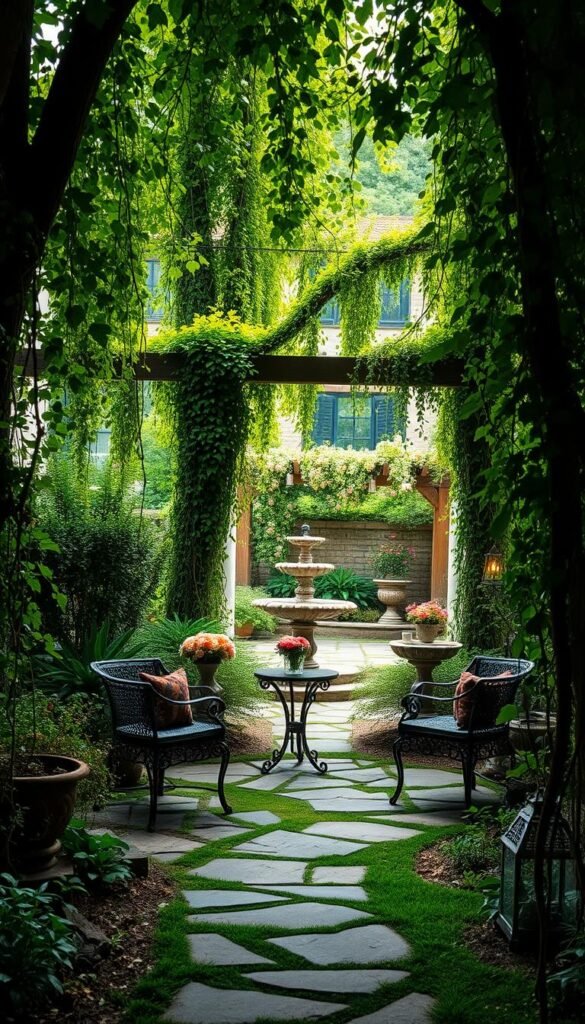Imagine stepping outside to a personal oasis where every corner feels like a page from a storybook. With thoughtful design, even modest outdoor areas can become magical escapes that spark joy and wonder. Whether you have a sprawling yard or a cozy patio, creativity can turn your space into a whimsical retreat.
Start by blending natural textures and soft lighting. Twinkling fairy lights draped over fences or woven through climbing vines add warmth after sunset. Pathways lined with smooth stones or fragrant herbs guide visitors through your sanctuary, while cozy seating nooks invite relaxation. For inspiration, explore how the cottagecore aesthetic merges practicality with fairytale charm.
Vertical gardening maximizes limited areas. Train jasmine or ivy to climb trellises, creating living walls that offer privacy and beauty. Pair these with weathered benches or repurposed furniture to add character without breaking the bank. Even small touches—like a birdbath tucked among blooms—can make your space feel intentional and inviting.
This guide will walk you through affordable, space-smart strategies to craft your own hidden haven. Discover how to layer textures, incorporate vintage accents, and design pathways that beckon exploration. Let’s transform your outdoor area into a place where everyday moments feel extraordinary.
Embrace the Magic of a Hidden Backyard Oasis
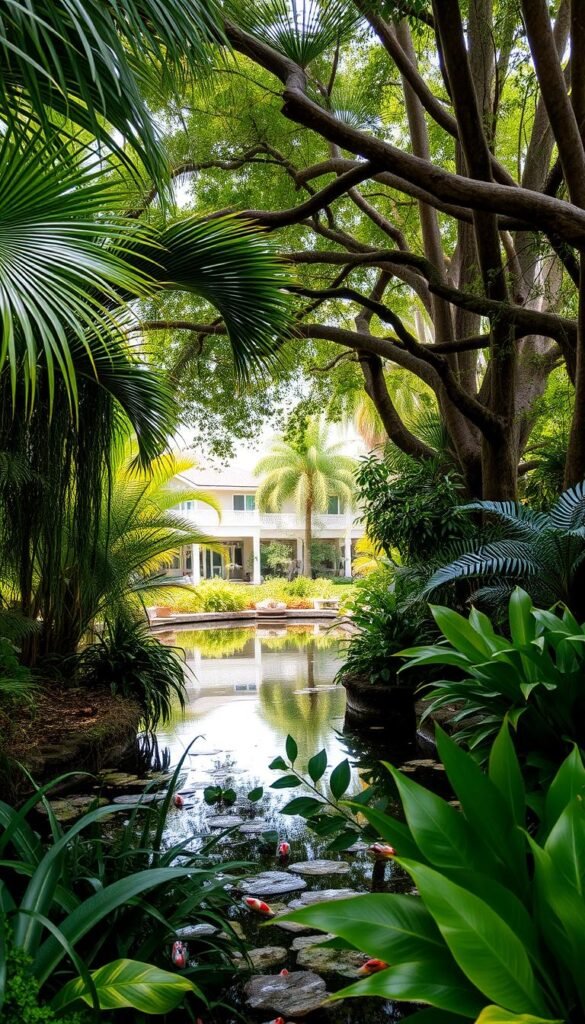
Your outdoor space holds pockets of potential waiting to become serene escapes. With strategic design, even narrow side yards or shaded corners can feel like extensions of your imagination. Begin by observing sunlight patterns and existing greenery—these clues shape your layout.
Discover the charm in every tucked-away nook
Look for underused areas beneath trees or along fences. A cluster of ferns or hydrangeas can turn a bare patch into a leafy hideout. For sun-drenched spots, lavender thrives while filling the air with calming fragrance. Pro tip: Curved pathways create curiosity, urging visitors to explore further.
Set the stage for your personal retreat
Layer textures to amplify nature’s beauty. Combine feathery grasses with smooth river rocks near seating areas. Add personality through DIY garden art projects, like mosaic stepping stones or repurposed containers. This approach blends practicality with whimsy without overwhelming your space.
| Zone | Plant Type | Key Benefit |
|---|---|---|
| Shaded Corners | Ferns | Adds lush greenery |
| Sunny Patches | Lavender | Fragrant & drought-resistant |
| Partial Sun | Hydrangeas | Colorful blooms |
Balance openness with privacy using tall grasses or climbing vines. A simple arbor draped with jasmine defines spaces while letting light filter through. Remember: your sanctuary should reflect what makes you pause and smile.
Transforming Your Outdoor Space with Enchanting Decor
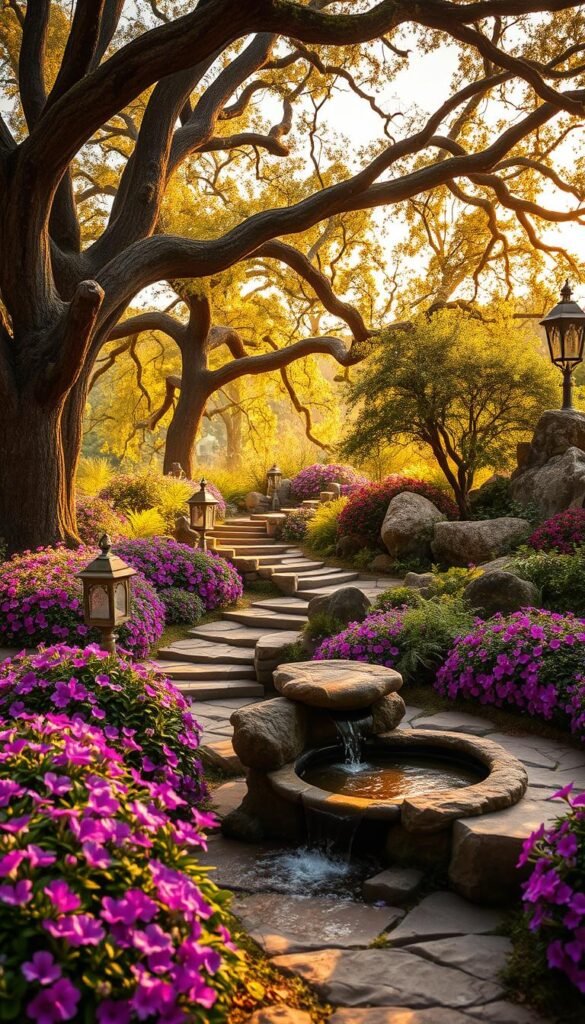
Blending eras in your garden design creates a timeless appeal that draws visitors in. Think of weathered iron gates paired with geometric concrete planters or a sleek metal bench nestled beside a moss-covered statue. This mix of old and new adds depth while keeping your space functional for modern living.
Mix vintage elements with modern touches
Scour flea markets for chipped terracotta pots or salvaged window frames. These pieces tell stories and add instant character. Balance them with minimalist elements like smooth concrete stepping stones or crisp-edged raised beds. A rusted garden arch draped in climbing roses becomes a focal point when framed by clean-lined gravel paths.
Try combining materials for contrast. Aged stone fountains pop against polished metal sculptures, while reclaimed wooden trellises complement glass bird feeders. For subtle art accents, hang repurposed mirrors among ivy to reflect light and create illusions of depth in tight spots.
Keep your layout intentional. Cluster vintage finds in one area to avoid clutter, then let open stretches of lawn or minimalist seating balance the look. This approach lets each piece shine while maintaining harmony. Remember: your garden should feel curated, not chaotic—a touch of mystery without confusion.
Choosing Whimsical Garden Elements That Speak to You
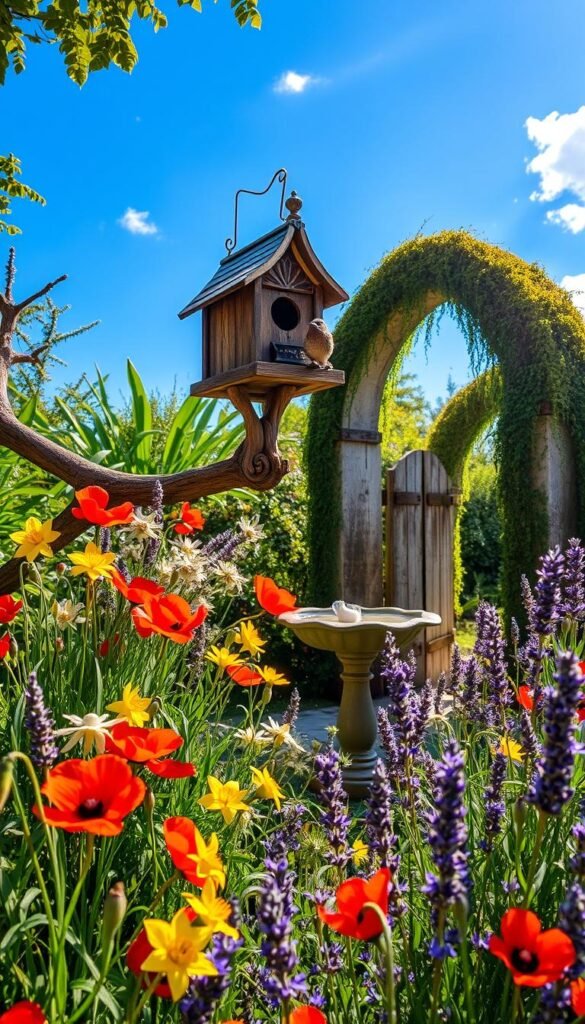
Every garden tells a story, and the right decor weaves your narrative into nature’s canvas. Start by selecting pieces that feel like extensions of your personality—whether that’s a quirky gnome peeking through ferns or a sleek modern sculpture contrasting wildflower beds.
Incorporate fairy lights, rustic benches, and hidden statues
Twinkling fairy lights aren’t just for holidays. Drape them along pergolas or wrap tree trunks to create year-round enchantment. Pair soft illumination with functional art—like a weathered bench tucked under climbing roses—to blend beauty with purpose.
Hidden surprises spark joy. Place a small stone rabbit among hostas or position a mosaic owl statue where sunlight catches its colors. “The best gardens reveal their secrets slowly,” says a landscape designer. Let visitors discover these treasures as they wander.
Scale matters. A colossal fountain might overwhelm a petite patio, while delicate wind chimes could vanish in a sprawling yard. Match ornament sizes to your space:
- Small gardens: Miniature bridges over dry creek beds
- Large areas: Statement pieces like wrought iron arches
- Vertical spaces: Hanging mirrors framed by ivy
Mix materials for depth. A polished metal birdbath beside rough-hewn stone steps adds contrast. For gardening enthusiasts, repurpose vintage tools as plant markers or turn old boots into quirky flower pots. Your choices should whisper, “This is my happy place.”
Secret Garden Ideas Backyard Edition: Hidden Nooks and Charming Details
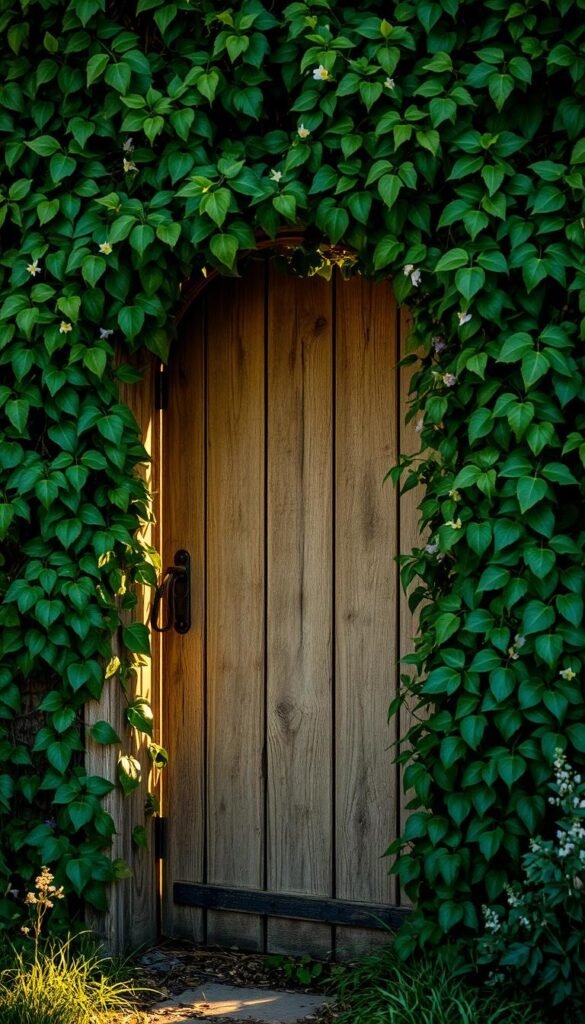
Transform ordinary pathways into enchanting journeys with living arches and floral gates. By weaving climbing plants into your design, you can craft spaces that feel both mysterious and welcoming. The right combination of greenery and structure turns simple entries into invitations to explore.
Create natural portals with climbing plants
Train vines to frame doorways or archways, guiding visitors toward hidden areas. Climbing roses or clematis work beautifully on wooden arbors, while fast-growing ivy thrives on brick walls. For a fragrant entrance, pair jasmine with a rustic trellis near your front gate.
Choose plants that match your climate. Wisteria adds drama in warmer zones but needs sturdy support. In cooler regions, honeysuckle offers rapid coverage and sweet blooms. “The key is selecting species that grow vigorously without overwhelming your space,” notes a landscape architect.
| Vine Type | Support Needed | Growth Speed |
|---|---|---|
| Climbing Roses | Metal framework | Moderate |
| Clematis | Wire mesh | Fast |
| Jasmine | Wooden lattice | Slow |
Balance wild beauty with structure. Use discreet ties to direct growth while maintaining a relaxed look. An arched door partially hidden by blooms creates anticipation—what lies beyond becomes part of the adventure. Keep pathways clear by trimming vines 6 inches above walking surfaces.
DIY Magic: Crafting Arched Doorways and Rustic Gates
A garden entrance isn’t just functional—it’s the first chapter of your outdoor story. With basic tools and creativity, you can shape arched passages or weathered gates that blend artistry with purpose. These features frame your space while adding layers of intrigue.
Step-by-step tips for building a memorable entrance
Start by sketching your design. Will it be a curved arch wrapped in climbing roses or a reclaimed barn door flanked by stone pillars? Measure your space to ensure proportions feel inviting, not overwhelming. For wooden structures, cedar resists rot, while metal offers industrial durability.
Gather these essentials:
- Circular saw (for cutting curves)
- Weatherproof wood glue
- Concrete mix for sturdy footings
Anchor posts 18 inches deep in concrete for stability. Assemble the door or arch on flat ground before securing it vertically. “Take your time aligning each piece—rushed work shows,” advises a carpenter.
Using salvaged materials for a unique look
Old doors, fence panels, or metal scraps gain new life as garden features. Sand rough edges, then apply outdoor sealant to preserve patina. Pair a chipped blue door with wrought-iron hinges for cottage charm, or use repurposed wooden elements to build a curved trellis.
Train plants like clematis or climbing hydrangea to soften edges. For moon gates, stack flat stones with mortar, leaving gaps for creeping thyme. Salvage yards often stock inexpensive bricks or vintage hardware—perfect for adding character without the price tag.
Infusing Life with Colorful Blooms and Lush Greenery
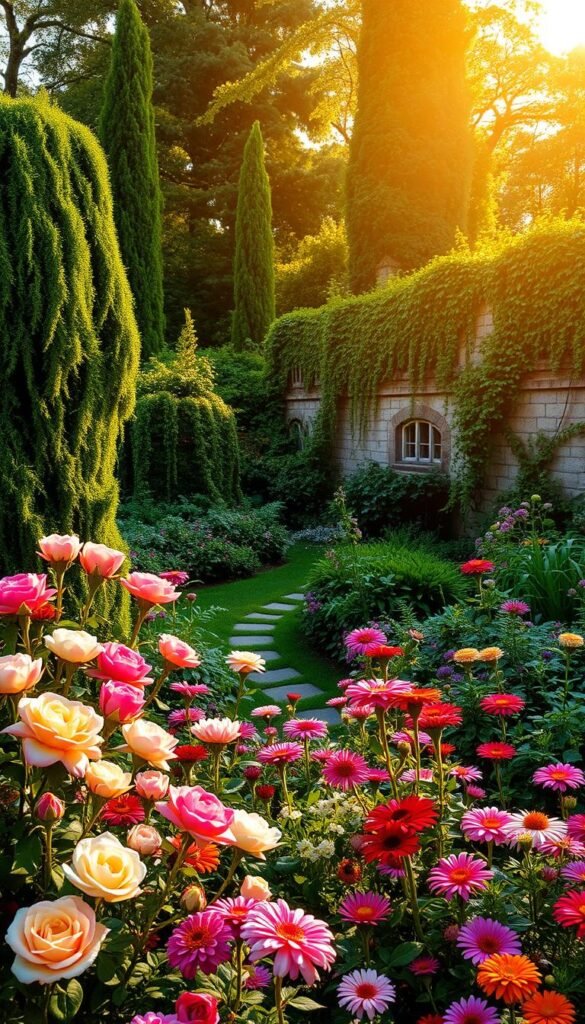
Color transforms ordinary spaces into living canvases. Frances Hodgson Burnett, creator of The Secret Garden, curated her floral displays with purpose—favoring roses and delphiniums while banning magenta hues. Like her gardens at Mayhem Hall, your space can thrive through thoughtful plant selection and strategic color pairing.
Selecting the best flowers for vibrant accents
Choose varieties that bloom in succession to maintain year-round interest. Early-blooming peonies give way to summer roses, while autumn sedums provide late-season texture. Match plants to your light conditions:
| Flower | Light Needs | Bloom Time | Color Palette |
|---|---|---|---|
| Roses | Full sun | Spring-Fall | Pinks, whites, yellows |
| Delphinium | Partial shade | Early summer | Blues, purples |
| Lavender | Full sun | Summer | Purple, violet |
| Hostas | Full shade | Summer | Variegated greens |
Burnett once wrote, “Where you tend a rose, a thistle cannot grow.” Apply this wisdom by grouping fragrant varieties like jasmine near seating areas. For shaded corners, pair white impatiens with blue hydrangeas—cool tones make small spaces feel larger.
Rotate seasonal flowers to keep your garden dynamic. Spring tulips transition to summer zinnias, followed by chrysanthemums in fall. This approach mirrors Burnett’s philosophy of elevating spaces through intentional gardening while maximizing visual impact.
Lighting Up Your Garden with Fairy Lights and Lanterns
As daylight fades, your outdoor space becomes a stage for soft glows and captivating shadows. Strategic lighting extends the magic of your sanctuary into evening hours, transforming familiar paths into pathways of wonder. The right balance of illumination keeps your secret garden inviting without overpowering its natural charm.
Create an inviting glow as the sun sets
Solar-powered fixtures offer effortless ambiance. Tuck them along walkways to highlight stone textures or position them beneath trees to cast leafy patterns. For a feel like twilight romance, drape string lights above seating areas—their warm sparkle turns ordinary nights into memorable moments.
Mix lighting types for depth. Lanterns with flickering LED candles add movement near water features, while recessed spotlights showcase sculptural plants. A landscape designer suggests, “Layer lights at varying heights—ground-level markers guide feet, while overhead strands frame the sky.”
Consider these weather-resistant options:
- Copper-wire string lights for delicate shimmer
- Solar stake lights with automatic dusk sensors
- Rustic metal lanterns using rechargeable batteries
Maintain your secret garden’s mystery by hiding light sources. Bury fixtures behind ferns or angle them upward through lattice panels. This approach creates intrigue—guests will wonder where the glow originates while enjoying safe navigation.
For gardening enthusiasts, integrate lighting into plant care routines. Illuminate raised beds for evening harvesting or install path markers to protect delicate blooms. Your illuminated secret garden becomes a nighttime retreat where practicality meets enchantment.
Drawing Inspiration from Garden Stories and Classic Literature
Great stories grow from fertile soil—both in literature and landscape. Frances Hodgson Burnett, author of the beloved book The Secret Garden, poured her gardening passion into every page. Her real-world gardens bloomed with roses and robins, shaping scenes that still spark wonder today.
How Burnett’s writings cultivate creativity
Burnett saw gardens as living stories. In her essays, she wrote:
“Even two yards of earth can become a paradise when tended with care.”
This philosophy shines through her plant choices—delphiniums for drama, snowdrops for hope. You can mirror this approach by selectingflowersthat carry symbolic meaning in your space.
Her bond with nature went beyond aesthetics. She designed garden inspired spaces to evoke emotion, like hidden benches for quiet reflection. Try these ideas from her work:
- Plant climbing roses near seating areas for fragrant privacy
- Add winding paths that mimic a story’s rising action
- Use vintage tools as decor to honor gardening history
| Plant | Literary Reference | Design Tip |
|---|---|---|
| Roses | Mary’s revival in The Secret Garden | Train on arches for dramatic entrances |
| Ivy | Overgrown manor walls | Control growth with weekly trims |
| Lavender | Colin’s healing journey | Border pathways for sensory appeal |
Burnett’s reading secret? Let your space unfold like a good book. Place surprises around corners—a birdbath here, a weathered journal there. These details create chapters in your personal life story, waiting to be discovered one stroll at a time.
Crafting Hidden Pathways and Secluded Seating Areas
Curving walkways and tucked-away benches turn your outdoor space into a living maze of discovery. By blending natural materials with thoughtful placement, you create moments that feel both intentional and spontaneous. Let’s explore how to guide feet and eyes toward your garden’s best-kept secrets.
Designing meandering routes that invite exploration
Winding paths spark curiosity. Use irregular flagstones spaced for casual strides or crushed gravel that whispers underfoot. For shady zones, line edges with velvety moss—it thrives in damp areas while softening hard borders. A landscape designer notes: “Paths should hint at what’s ahead without revealing everything.”
| Material | Aesthetic | Maintenance |
|---|---|---|
| Natural Stone | Rustic charm | Weed occasionally |
| Mulch | Woodland vibe | Refresh annually |
| Brick | Structured elegance | Sweep debris |
Finding the perfect spot for a cozy garden bench
Seating becomes magic when framed by nature. Look for dappled shade under trees or beside climbing vines on an arch. Position benches to face focal points—a bubbling fountain or butterfly-attracting blooms. Pro tip: Leave 3 feet behind seats for people to pass comfortably.
Consider these elements for intimate nooks:
- Overhead pergolas draped with wisteria
- Weather-resistant cedar or powder-coated metal
- Side tables made from tree stumps
Pair pathways with seating to create rhythm. A stone loop leading to a fern-surrounded bench invites pause. In your secret garden, every turn offers new delights—a hidden spot to sip tea or watch dragonflies dance above water features.
Balancing Natural Beauty with Routine Maintenance
A thriving garden walks the line between wild charm and thoughtful care. Your secret garden flourishes when you nurture its natural flow while gently guiding growth. The key? Knowing when to intervene and when to let nature take the lead.
Tips on trimming, pruning, and caring for delicate plants
Ivy adds romance to stone walls but needs quarterly trims to prevent root damage. Moss thrives with weekly misting in dry climates—use a spray bottle to mimic forest-floor moisture. Grapevines demand strategic pruning: cut back 30% in early spring to boost fruit production while maintaining their lush canopy.
| Plant | Maintenance Task | Frequency | Benefit |
|---|---|---|---|
| Climbing Ivy | Trim roots | Every 3 months | Protects structures |
| Moss Patches | Mist water | Twice weekly | Prevents drying |
| Grapevines | Prune stems | Early spring | Encourages growth |
Shade-loving flowers like astilbe need less pruning than sun-hungry roses. “Gardening teaches patience,” notes a horticulturist. “Trim after blooms fade, not when you’re eager for spring color.” Time tasks with seasons—divide perennials in fall, feed soil in winter.
Turn care into meditation. Water at dawn while birds sing, or deadhead roses as twilight falls. These moments deepen your bond with the garden while keeping it healthy. Remember: every snip and sprinkle helps your sanctuary evolve while keeping its magical spirit intact.
Enhance Your Space with Vintage Garden Art and Accessories
Your outdoor retreat gains depth when vintage accents tell stories of the past. These pieces blend history with nature, creating focal points that feel both nostalgic and fresh. Start by selecting items that resonate with your personal style—whether it’s a wrought-iron gate or a sun-bleached stone planter.
Choosing decor pieces that add personality
Look for weathered mirrors to hang among ivy—their aged glass reflects light while creating illusions of expanded space. Stone fountains surrounded by boxwoods bring fairytale charm, especially when paired with climbing roses. For inspiration, visit local flea markets to discover unique items like copper lanterns or hand-carved benches.
Balance is key. Cluster smaller antiques on a rustic table rather than scattering them. Check materials for durability—cedar withstands moisture, while terra cotta needs frost protection. In New York’s climate, prioritize pieces with proper drainage to survive seasonal shifts.
Let each find shine. A single ornate gate becomes a backdrop for clematis, while vintage tools mounted on a shed wall add industrial flair. Your garden becomes a curated gallery where every art piece whispers tales of its former life.

